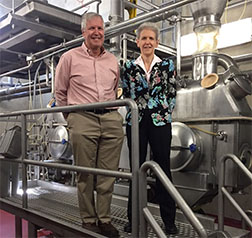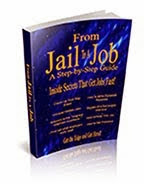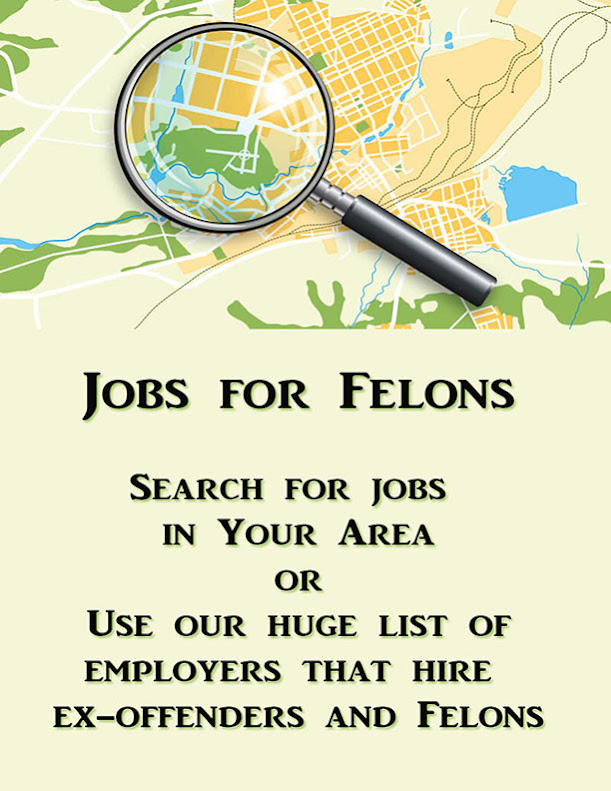- More American companies, such as McDonald's and Delta Air Lines, are hiring ex-cons as part of their inclusion strategy.
- Executives say 82 percent of their ex-offender hires have been at least as successful as their average hire, according to a report by the Society of Human Resources Management.
- Only 14 percent of human resources managers won't consider hiring ex-offenders.
Ty Hookway had to check on an office building his building services company, CleanCraft, was set to clean in upstate New York, and what he saw changed his business and his life. The maintenance person who was supposed to do the work had called in sick, and when Hookway got there, he found one of his newer hires, Sanford Coley, in the building, working away in shorts rather than his uniform.
But what really got Hookway's attention: The shorts revealed that Coley was wearing an ankle bracelet. He was on parole for bank robbery. Hookway hadn't thought to ask about Coley's criminal record.
"I was thinking I should fire him," Hookway said. "Now he's one of my best friends."
More stories like this may be coming to offices like yours. With the job market tight, ex-felons and other workers who often struggled to find jobs are getting a second look, according to a recent report by the Society for Human Resource Management, which surveyed more than 2,000 corporate managers and HR executives nationwide on their attitudes about ex-offenders for a report released in May.
Unemployment among ex-felons isn't explicitly tracked by the U.S. Bureau of Labor Statistics, and it was estimated at 27 percent last year by the Prison Policy Initiative. But some researchers think it's even higher — informal estimates claim as many as half of released convicts failed to find jobs or stayed out of the labor force. Since an estimated one-third of U.S. adults have at least an arrest record, according to the human resources society, it's a lot of people.
"This isn't a problem of aspirations, it's a structural problem involving discrimination and a lack of opportunities available to people who have been to prison," said Lucius Couloute, a policy analyst at the Prison Policy Initiative. "It really takes employers who are willing to let go of their biases in pursuit not only of equality but of the best candidates."
Corporations are showing at least some signs of interest, advocates say. In addition to SHRM's study, the job site Glassdoor barred job listings from employers who intend to weed out ex-offenders. New Jersey-based consultant Eric Mayo says a long list of top American companies have proved themselves open to hiring ex-offenders, mostly for service jobs, ranging from minimum-wage employers from McDonald's to CNBC parent Comcast and, in Mayo's Atlantic City backyard, casinos, which he said are practically cities unto themselves, demanding an array of service workers.
Corporations are showing at least some signs of interest, advocates say. In addition to SHRM's study, the job site Glassdoor barred job listings from employers who intend to weed out ex-offenders. New Jersey-based consultant Eric Mayo says a long list of top American companies have proved themselves open to hiring ex-offenders, mostly for service jobs, ranging from minimum-wage employers from McDonald's to CNBC parent Comcast and, in Mayo's Atlantic City backyard, casinos, which he said are practically cities unto themselves, demanding an array of service workers.
"It really takes employers who are willing to let go of their biases in pursuit not only of equality but of the best candidates."
"I encourage people to apply for every job they feel qualified for," Mayo said. "Even without a felony record, looking for a job is a numbers game.''
To stoke more action, the federal government is offering a tax incentive called the Work Opportunity Tax Credit for employers who hire and retain ex-felons, veterans and individuals from other target groups with significant barriers to employment. Under this program if an employee works at least 120 hours a year, a company can claim a 25 percent tax credit of their first year's wages and 40 percent if he or she works 400 hours.
Some cities and states also offer tax credits and other incentives to employers willing to hire ex-cons and give them a second chance. Philadelphia's Fair Chance Hiring Initiative provides a cash reimbursement to employers who hire felons that have been released from prison within the past five years.
Many employers are apprehensive about hiring felons and look for ways to hedge their risk. They partner with local organizations that work to train ex-cons for jobs and provide other types of rehabilitation services. To find these organizations, state unemployment or workforce development offices can offer referrals.
The Federal Bonding Program is another option companies turn to. This program bonds felons who are hired and mainstreamed by companies of all sizes. The bond provides compensation if an employer suffers theft or loss due to the employee's dishonesty.
Eliminating bias in the workplace
If there is a ground zero for the push to destigmatize a criminal history in the workplace, it is Greyston, a 100-person Yonkers, New York, bakery that makes mostly brownies for a client list that includes Unilever's Ben & Jerry's Ice Cream unit, Amazon's Whole Foods grocery chain and Delta Air Lines. "We consider them the crown jewel of our values-led sourcing program," said Unilever spokesman Sean Greenwood, pointing out that Greyston, while founded by a Buddhist monk with a mission to do good, has balanced its social mission with being a reliable, businesslike supplier for decades.
Greyston's "open hiring" model means that anyone who puts their name on a list for a production job can have one as they become available, CEO Mike Brady said. The trick is, they have to make it through an apprenticeship program designed to test (and build) their basic work aptitudes, such as staying on schedule and working well with others. About half don't make it, Brady said. But enough do to convince Greyston that other companies would be better off investing less in screening out workers and more in training and supporting them to capitalize on second chances and on connecting them to social services they need to support a transition to working life.
More from At Work:
"We'll hire anyone who walks through the front door — no questions asked," said Brady, who estimates that about 40 Greyston workers have criminal records. "We do everything we can to make them successful. But if they're not, we let a lot of people go.''
Two such candidates are one-time drug dealers Dion Drew and Alvin Wilson. Drew, 41, grew up in Yonkers and said he plied his old trade a three-minute walk from Greyston. Wilson, 64, spent nearly a decade after his release as a self-employed contractor, doing everything from carpentry to snow shoveling before coming to work there.
Drew has become an ambassador for open hiring, even doing a Ted Talk with Brady about it. He got out of prison in 2008 after his third conviction, got rejected everywhere he applied, and landed a $7.15-an-hour gig as a Greyston apprentice in 2009. He's now a $25-an-hour supervisor with an eight-year-old daughter and two stepchildren. He claims he has the two dogs and now "just needs the house."
 |
| Greyston CEO Mike Brady with employee Dion Drew, a former drug dealer |
Wilson is a mixer on the brownie line, where the quickly moving array of goodies waiting to be wrapped recall the famous scene from I Love Lucy where the heroines land short-lived jobs in a candy factory (the bakery makes about a tractor-trailer load of brownies daily, or 7 million pounds per year). He was released in 2008, from the last of his five felony cases, and arrived at Greyston two years ago.
Both said their big problem in getting back to work was learning how to take direction and fit in, as people do in the workplace. And each said the biggest difference between themselves and others who fail at reentering society is that they simply decided, while in jail, that they had to do better.
"If you can't make your mind up in 12-and-a-half years what you want to do in life, it's never going to happen," Wilson said.
"I set my goals and plans while I was upstate," Drew added. "I wanted to save money the right way, to have a family. I wanted to put the smile back on my mom's face.''
Greyston now is trying to package its approach to lure in other companies. Just a short drive from its factory, Greyston set up the Center for Open Hiring, which Perry Solomon, a consultant working on the project, described as a way of training companies to "think the right way" — swapping expenses spent finding workers who don't have red flags for more investment in training.
"Where I see the ROI is in tremendous loyalty, productivity and culture," Brady said.
Changing attitudes
A study on employers' attitudes toward hiring ex-felons suggests that many are ready for change. Only 14 percent of human-resources managers won't consider hiring ex-offenders, the report commissioned by the Society of Human Resources Management and funded by the Charles Koch Instituted says. The biggest reason is simple: 82 percent of executives say their ex-offender hires have been at least as successful as their average hire. Other common motivations were to help build communities and give ex-offenders a second chance.
 |
| Greyston's president and CEO Mike Brady in front of the company's Center for Open Hiring |
But only 5 percent actively recruit ex-offenders, the survey said. The most important factors in getting hired: A verifiable work history, and some level of education or training after the workers were convicted, indicating that they improved themselves while imprisoned.
That's consistent with a study by the RAND Institute, which found that 59 percent of employers would consider an ex-offender with one conviction if they were given an incentive through a tax credit, which they are offered under federal law. But the biggest difference-maker is if employers can recover staffing-agency fees they pay to find workers who don't stick with the job, or get the agencies to find them a replacement worker for free if they take a chance on an ex-offender who doesn't work out.
Rand found that employers are much less willing to look at felons with a history of violence, such as robbery charges, Rand scholar Priscilla Hunt said.
"What they responded to was staffing-agency fees," Hunt said. "Even more than if you increased the [tax credit] money."
What doesn't appear to work as well is trying to force employers' hands by forbidding them to ask about criminal records on job applications. So-called "ban the box" laws, named for the check-box next to questions about whether applicants have records, often lead to racial discrimination, as employers screen out a broad swath of minority applicants in order to avoid interviewing ex-offenders, according to research by Rutgers University economist Amanda Agan.
Screening out ex-offenders can also subject employers to liability for policies that have a disproportionate racial impact, said Dariely Rodriguez, director of the economic justice project at the Lawyers' Committee for Civil Rights Under Law.
"Employers have an obligation not to discriminate," Rodriguez said. "They have an obligation to root out bias."
Mostly, employers can help ex-offenders while also helping themselves, Hookway said.
"You have to develop the culture where everyone is on board," Hookway said, comparing ex-offenders with work-friendly attitudes to people who have succeeded in addiction treatment. "Once they get on the right side, they become advocates. They'll hold other employees accountable. They want it more."
Why companies are turning to ex-cons to fill slots for workers
companies hire felons | | Companies that hire ex-offenders | Employers that hire ex-offenders | employers that hire felons | | jobs for ex-offenders | jobs that hire felons | places that hire felons | felon friendly jobs | felon friendly employers | how to get a job with criminal record | second chance jobs for felons | temp agencies that hire felons | high paying jobs for felons
Eric Mayo














